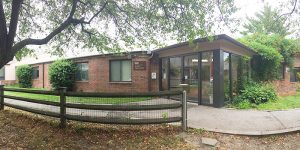This article was authored by Xihan Yang, a member of the Crehan ASD Lab.
On February 27th, 2020, the Crehan Lab hosted a Community Advisory Board Meeting in the curriculum lab. The goal of this annual meeting is to integrate community voices into our autism research through open dialogue. Attendees represented a range of disciplines and programs, including Tufts Student Accessibility Services and the Tufts Academic Resource Center, the Autism Program at Boston Medical Center, occupational therapists, students, and self-advocates. Dr. Crehan described five ongoing studies, a potential future project, and administrative questions, and board members were encouraged to give feedback out loud or in written form after meeting, depending on their comfort level.
The Looking Study uses eye tracking to understand social cognitive processes in children with ASD and/or ADHD with the goal of understanding how social cognitive abilities manifest as eye movements. The board suggested providing some background information on the characters, such as their social relationships, used in the theory of mind stories and paradigms. The example they provided included creating a story with characters who had a positive or negative relationship. One of the board members also encouraged the lab to expand the participant population and include people without ASD, allowing us to compare patterns relative to diagnostic status. These comparisons could enable us to provide materials or social stories targeting the needs of the autistic population in future work. Including individuals without ASD can also give a preview for further research studies on individuals’ understanding of different social relationships in various contexts, which would be applicable to a larger population. Other suggestions included combining the lab’s ongoing study in relation to sex education and sexuality questionnaires with the study of theory of mind.
Physical activity for adults with ASD is a new topic that the lab is preparing this year. The board members recommended the lab start with focus groups to figure out the specific activities and exercises that adults with ASD are interested in. Planning of physical activities among the autistic population was also discussed and recommended to be pushed later.
These community stakeholders brought important new perspectives for future research. Personally, I asked questions about conducting sexual education among autistic teenagers in relation to our current project. The board proposed a shorter time span of the curriculum and reminded me that the content need to be succinct and appropriate for the autistic group. In general, this community advisory board meeting not only provided our lab some insights that we previously had not thought of and provided guidance for future research directions, but also gathered input from people who are invested in positive outcomes for individuals with autism.
The lab intends to hold similar events in the future to strengthen the bond with the autism community and form connections between resources and individuals with ASD. For future events, we want to invite more board members. Other than the current board members, relevant policy makers and special educators can also be potential attendees. The format of the meeting can also be extended to online meetings and even periodic report and communication among board members and research teams. With the cooperation of different groups and incorporation of various views, we expect a brighter future for autism research.


 ABOUT
ABOUT